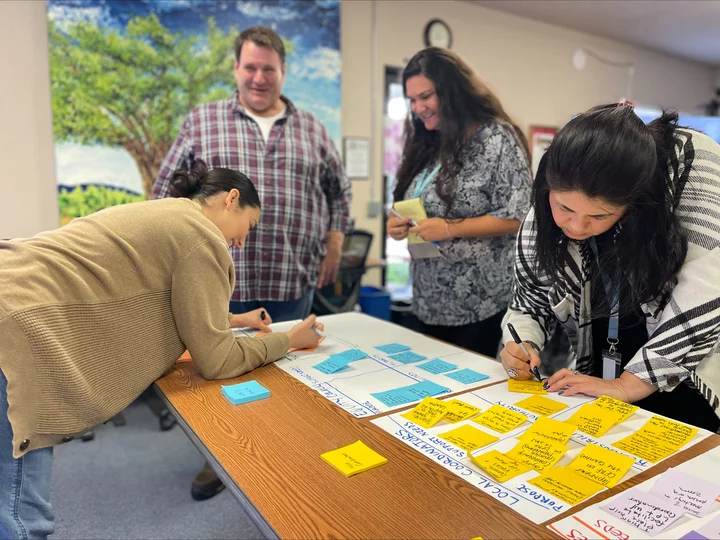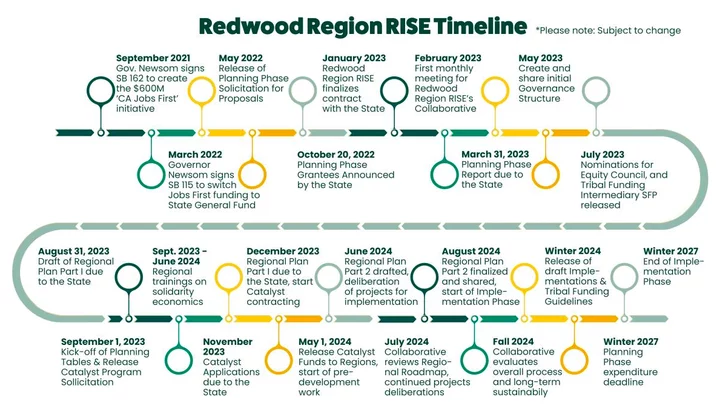Redwood Region RISE’s Outreach Team at North Coast Opportunities synthesizing conversations that are taking place with local communities throughout our region to surface local needs | Submitted by Leoni Fohr
###
After receiving $14 million in funding through the California Jobs First initiative, Redwood Region Resilient Inclusive Sustainable Economy (RISE) – a relatively new community coalition – is developing a vision to bring more good, sustainable jobs to our region.
Leoni Fohr, a communications associate for the California Center for Rural Policy (CCRP) at Cal Poly Humboldt, told the Outpost that RISE was formed in 2021 after the California Jobs First initiative (SB 162, formerly known as the Community Economic Resilience Fund) was signed into law with the intent of supporting statewide economic recovery from the distress of COVID-19. It took a while for things to really get going, Fohr said, and the coalition started meeting regularly in February 2023.
“This past year has been a lot of building up the program, conducting outreach and education and getting folks involved,” Fohr said in a recent phone interview. “We have close to 1,000 members in our community and a lot of representatives from community-based organizations.”
Those members are made up of representatives from local tribes, education, environmental justice groups, labor unions and government bodies, collaborating to create a 10-year vision to create more jobs and foster a sustainable economy in Humboldt, Del Norte, Lake and Mendocino counties and tribal lands. The California Center for Rural Policy acts as part of the coalition’s “convening team,” which is in charge of bringing together the various groups and organizations, and also includes representatives from the Arcata Economic Development Corporation, North Coast Opportunities and True North Organizing Network.
Chart showing RISE’s timeline | From RISE’s website
Currently RISE’s vision is still in the planning phase, Fohr said, and it’s working to identify which projects and programs the coalition wants to support. RISE has been accepting project proposals, and Fohr said that the $14 million funding will go toward continuing the selection process and prepping the chosen projects to ready them for additional grant funding. Though the $14 million will not go far enough to actually launch the selected proposals, Fohr said, it will allow RISE to get the projects “shovel-ready,” so that they are eligible for competitive grants to keep the projects going.
“It takes a lot for a project to move from planning to implementation,” Fohr said. “That’s where a lot of projects get stuck – there is funding for the planning, but not enough funding to keep them running. At the end of August 2024, there’s $26 $260 million becoming available in competitive funding. We’re hoping to get the projects ready to apply for that funding.”
RISE is selecting a wide range of proposals, Fohr said, that would support job creation or workforce development, including developing youth job-training centers, healthcare training and scholarship programs for training firefighters. RISE is particularly interested in supporting programs that offer creative solutions to more than one economic problem, Fohr said. For example, one project RISE is looking to support would work with local healthcare partners to establish an art therapy program and train local artists to lead the classes. This would address our area’s lack of mental healthcare, while also creating jobs for out-of-work artists.
If you have a great idea for a project or program that will stimulate our regional economic development, RISE is still accepting proposals via its Project Inventory Intake Form. RISE will continue accepting submissions on an ongoing basis, but the deadline to be considered for implementation funding is March 28.
And if you don’t have a proposal to submit, but are still interested in being involved in RISE’s decisions or just want to learn more about the coalition, you can attend one of RISE’s monthly Collaborative Meetings, held over Zoom on the last Thursday of each month. That means the next meeting is coming right up – Thursday, March 28, from 11 a.m. to 12:30 p.m. You can join by following this link.
RISE is meant to be a community-led coalition, so Fohr encourages everyone to get involved in whatever way they can to help RISE hear directly from members of the community on their needs.
“It’s a fairly new approach to really working with communities…to hear from them what they need,” Fohr said. “This is so valuable on a state level, because it’s hard to picture what it’s like living in a rural area. If RISE does a good job we can show our area’s unique difficulties, but also show our resilience.”
###
CORRECTION: This article has been changed from its original version to reflect that $260 million, not $26 million, will be available in competitive funding. That’s a big difference! It has also be changed to reflect that CCRP is a part of Cal Poly Humboldt.


CLICK TO MANAGE